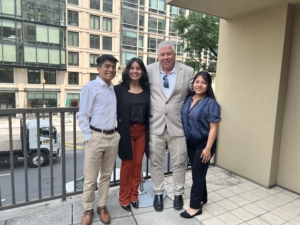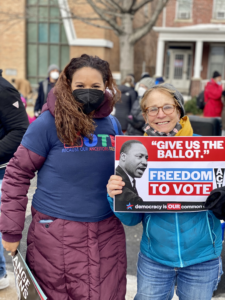
Reflections on the 5th Global Conference on the elimination of child labour in Durban, South Africa: May 15-20, 2022
Reid Maki is the director of child labor advocacy at the National Consumers League and he coordinates the Child Labor Coalition.
The recently-concluded week-long “5th Global Conference on the Elimination of Child Labour” in Durban, South Africa was convened against the backdrop of the announcement last July of an alarming rise in child labor numbers after two decades of steady and significant declines in global child labor totals.
The global conference, which typically comes about every four years, brought together an estimated 1,000 delegates from foreign governments and small number of representatives of NGOs. It also brought together for the first time at one of the quadrennial child labor conferences dozens of participant youth advocates as well as a number of child labor victims and survivors.
The conference had the difficult mission of righting the ship and trying to reverse the rising child labor numbers, which seem destined to rise further as the COVID pandemic’s impact will continue to be felt for years. Sadly, the pandemic threw 1.6 million children out of school, often for prolonged periods and some of those children entered work and may never return to school.
We would first like to thank the South Africa government for the herculean task of organizing a global conference during a still raging pandemic, all against a backdrop of devastating floods in April that savaged the provinces of KwaZulu-Natal and Easter Cape and killed nearly 500 people, destroyed 4,000 homes and displaced 40,000 people.
As the conference opened, Guy Ryder, the Director General of the International Labour Organization, which helped advise the government of South Africa on the organization of the conference, suggested that the rise in 8 million child laborers from 152 million to 160 million likely represented complacency and a loss of focus by global governments on the child labor problem and must be rectified. He noted increases in child labor impacting children under age 11 and urged delegates to redouble their efforts. “We need to increase our efforts, and pay particular attention to child labor in agriculture,” said Ryder, who added that child labor advocacy is threatened by a “perfect storm” created by COVID’s enduring impact, rising food insecurity, and debt crises that are expected to impact 60 nations in the coming years.
South Africa’s president Cyril Ramamphosa delivered a stirring welcome. He noted that his country’s embrace of child rights is not just a matter of principle. “The assertion of the rights of children was a direct response to the deprivation, discrimination and deliberate neglect that had been visited on the black children of this county by successive colonial apartheid administrations,” said Ramamphosa. “Child labor perpetuate the cycle of poverty, denying young people the education they need to improve their circumstances. It condemns communities to forms of economic activity and labor that limit any prospect of advancement or progress.”
Nobel Peace Prize laureate Kailash Satyarthi noted the particular challenge that the sub-Saharan African region is facing with the highest rates of child labor and one in five children are in child labor.
Satyarthi urged listeners to embrace the idea that every single child can be protected from child labor. “Let us march from exploitation to education,” he urged, calling for children to have a “fair share” of resources. The amount needed to ensure all children have access to needed resources is only $53 billion – not much considering the wealth of many nations, said Satyarthi who also noted that the *G7, which is about to meet on June 26th, has never focused attention collectively on child labor. “This needs to change,” he urged.
The conference opened with a pledge by European Union (EU) Commissioner Jutta Urpilainen that the EU will create a new $10 million euro initiative to reduce child labor in agriculture. Child labor must return to the political agenda, she urged.
The six-day conference, attended by 1,0000 delegates in person and an estimated 7,000 online, according to organizers, featured workshops and side events, and included three meetings every other day by separate groups of employers, workers, and governments. Readers can find a conference agenda here with video links to many sessions.
Twenty-four side events focused on many related topics including child labor in supply chains, a decent work agenda, youth-led activism, small-scale mining, livelihoods skills development, African priorities, partnership in Latin America to end child labor, due diligence legislation, data and research needs, labor inspections, artisanal fisheries and aquaculture, and a child-labor-free zone in Ghana. For a complete list and to view specific side events, please go to agenda, scroll each day’s offerings and click links to the videos.
Attendees learned a lot about specific intervention efforts, and the struggles many nations are engaged in, including Malawi, which has recently been hit by two cyclones and where there is a shortage of 50,000 schools – less than half of the children have access to education, said the nation’s Education Minister Agnes Nyalongje. She pleaded for international help, noting that 12 years of sustained aid could create generational change in Malawi and fix its troubled education system.
It’s difficult to summarize the hundreds of hours of content but readers may get a sense from the CLC’s twitter stream which included four to five dozen original tweets at @ChildLaborCLC.
The conference’s concluding “Call to Action” document emphasizes the need for urgent action, because “the consequences of the COVID-19 pandemic, armed conflicts, and food, humanitarian and environmental crises threaten to reverse years of progress against child labour”. The document includes commitments in six different areas:
- Make decent work a reality for adults and youth above the minimum age for work by accelerating multi-stakeholder efforts to eliminate child labour, with priority given to the worst forms of child labour.
- End child labour in agriculture.
- Strengthen the prevention and elimination of child labour, including its worst forms, forced labour, modern slavery and trafficking in persons, and the protection of survivors through data-driven and survivor-informed policy and programmatic responses.
- Realize children’s right to education and ensuring universal access to free, compulsory, quality, equitable and inclusive education and training.
- Achieving universal access to social protection.
- Increasing financing and international cooperation for the elimination of child labour and forced labour.
As is often the case at conferences, many of the side conversations are of great interest. We had many great conversations with Simon Steyne, who recently retired from the International Labour Organization but continues his child labor advocacy. Simon is campaigning to bring about a child-labor-in-agriculture conference in the coming year. With 70 percent of global child labor in agriculture and rising child labor rates, a focus on agriculture at this time is absolutely essential, Steyne argued.
What might have been improved at the conference? It seems that a relatively small number of Civil Society participants were invited to the conference, included few from the Americas and Asia. The pandemic and travel distances certainly impacted in-person attendance. And we know a lot of NGO participants were able to join online. We hope that a broader spectrum of Civil Society is invited to future global child labor conferences. NGO delegates often possess in-the-field, grass roots knowledge lacked by government and employer groups and NGO presence is a key element in the fight to reverse accelerating incidence of child labor.
The Civil Society advocates and experts who were there enhanced the conference greatly, mostly through the two dozen side events. We were delighted to be joined at the conference by CLC members Bank Information Center and GoodWeave, which organized the side event “Child Labour Free Supply Chains: Tackling Root Causes from Maker to Market” — included panelist Thea Lee, the deputy undersecretary for International Affairs at the U.S. Department of Labor, who was ubiquitous at the conference. CLC-member Action Against Child Exploitation (ACE) also presented a side event: “Promoting an Integrated Area-based Approach to the Elimination of Child Labour: A Case of the Child Labour Free Zone in Ghana,” with Yuka Iwatsuki, president of ACE among the panelists.
In addition to thanking our gracious South African hosts and the ILO for its organizing role, the CLC also wishes to express appreciation to our valued partners the Global March Against Child Labour and the Kailash Satyarthi Children’s Foundation for enhancing the conference significantly through organizing side events and bringing the voices of youth advocates to Durban.
Tara Banjara. 17, was among the youth advocates who appeared as a panelist. Tara said she is from a community in India where there are no schools and “no one had an idea about what education is.” She was four and half when she went to work on roads with her mother. They cleaned garbage and rubble out of potholes. The work was exhausting and difficult and went on till she was rescued by Bachpan Bachao Andolan’s Bal Ashram.
Today, Tara is the first girl to complete grade 12 exams in her entire family. She asked attendance participants gathered in Durban and the thousands on line: “Is this our fault that if we are born in a small village, we do not have the right to live our childhood with freedom?” She asked.
“We want freedom. We want the right to education,” Tara said, sharing her dream of becoming a police officer some day and working at the grassroots level to ensure that all children have equal rights and freedom. In one of the conference’s emotional high points, Tara asked attendees to stand and make a pledge: “Let us all pledge to create a world where every child is free from slavery; every child gets an education and an opportunity to fulfill their dreams.”
*Links are no longer active as the original sources have removed the content, sometimes due to federal website changes or restructurings.

























